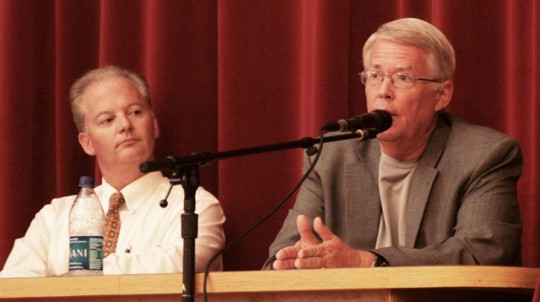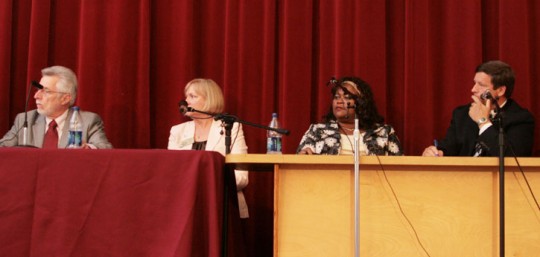Future Of Class Size Amendment 8 Campaign In Question
September 2, 2010
Republican lawmakers have spent much of the past two years advocating a rollback of a constitutional cap on the number of students in school classrooms. But now that the proposed tweak is on the November ballot, one question remains: Who is going to campaign for a looser standard, and who will pay for it?
The Florida Association of District School Superintendents and the Florida Association of School Boards fought for legislative approval this past spring, but it will take more to get 60 percent of the voters to sign off on changing the requirements. And the two groups are squaring off against a frequent ally, the Florida Education Association, the statewide teachers’ union that could mount a serious, well-funded campaign in opposition to the proposal.
Bill Montford, executive director of the Florida Association of District School Superintendents, said there was never any expectation that his association put up the money to fund a public campaign in favor of the proposal, known as Amendment 8. The superintendents and school boards, he said, simply don’t have the money.
“That’s one of the problems,” said Montford, also a candidate for the state Senate. “So, I’m not sure how the campaign will be funded.”
In 2002, voters overwhelmingly passed the class size constitutional amendment that capped individual classrooms at 18 students in kindergarten through third grade, 22 in fourth through eighth grade, and 25 in high school, with the limits having been phased in since the amendment was passed. But with shrinking state revenues, many school districts said they cannot implement the class size caps as originally envisioned.
 The Escambia County School District held two public workshops to lobby for a “Yes” vote on Amendment 8. Click here for that story.
The Escambia County School District held two public workshops to lobby for a “Yes” vote on Amendment 8. Click here for that story.
Last week, the hard caps on individual classrooms went into effect.
Lawmakers who support the change are counting on school districts to get the word out through a grassroots approach to voters.
“Our network is full of parents, school administrators and school board members,” said Rep. Will Weatherford, R-Wesley Chapel, who sponsored the amendment in the Legislature.
Weatherford said he believes several groups will raise money to fund a campaign and that Tallahassee public relations executive Ron Sachs would be coordinating that effort. The law allows for groups to create largely unregulated committees known as 527s, which could allow a variety of groups to pump cash into it to fund a public campaign, but neither Weatherford nor Sachs would specifically say where the money will come from.
Sachs, in an interview with the News Service Wednesday, said the campaign is banking on a coalition of groups for support and will rely heavily on the gubernatorial campaigns – both GOP nominee Rick Scott and Democratic candidate Alex Sink support the change – as well as news media coverage and social media tools to publicize the need for the amendment. He also hopes the group will be able to air commercials regarding the issue closer to the election.
“If we don’t revise class size it is going to be the single biggest killer of state local budgets and family budgets,” Sachs said.
Rocky Hanna, the principal at Leon High School in Tallahassee and a supporter of Amendment 8, said that in a perfect world, the classroom cap system would work, but the schools simply have not received an adequate amount of money from the state to carry that out and therefore need some flexibility.
He admits he doesn’t foresee voters approving the class size tweak, but he thinks parents are getting the message about how the class size requirement is handicapping schools.
“They know, they’re getting the message now this fall because there’s no wiggle room.” Hanna said. “When they ask for schedule changes from this to AP, from honors to general. Sorry, I’m sorry. We cannot accommodate you.”
On the flip side, the Florida Education Association is already working to persuade voters to vote no on Amendment 8. The group filed a lawsuit to boot the amendment from the November ballot and a Leon County circuit judge will hear the case next week. But it is also preparing to mount a significant campaign to defeat the amendment should it wind up on the ballot.
State Sen. Alex Villalobos, R-Miami, is chairing the “Vote No On 8″ campaign in coordination with the union, which has had a history of success in galvanizing teachers across the state to advocate on behalf of various causes. The group does not think it will be tough to convince voters to strike down the proposal.
“I haven’t heard any classroom teachers or any parents say they want more kids in their classroom and I think that’s what we need to make clear,” said FEA spokesman Mark Pudlow.
Pictured: Members of the Escambia County School Board lobby for Amendment 8 at a recent workshop meeting at Northview High School. NorthEscambia.com photos, click to enlarge.
Comments
7 Responses to “Future Of Class Size Amendment 8 Campaign In Question”




PLEASE vote NO on amendment 8. Teachers have all the students they can handle by themselves. No aides, very few parents and few volunteers are in these classrooms. I don’t pretend to know the answer to this problem but I think a very good place to start is in administration. Overhead has always been a problem in Esc. Cty. Fewer people doing more and better work would help a lot.
I strongly agree that smaller amounts of students in classrooms are much better, giving the teachers and students more one on one time to learn; rather than having a larger amount of students in each classroom and the students not getting the proper education being taught to them, because of the teachers not having enough time to help them more…
If they make classes bigger they will downsize teachers to cut costs , thats not good for education
Vote NO on ALL Amendments.
We elect representatives to go to Tallahassee and legislate on our behalf. They don’t have the backbone to do the job they were elected to do, so they put everything they can on an amendment. Then when it don’t work as advertised, they can say “I didn’t vote for that, thats not how I would have done it”. If they do pass and turn out to be flawed, the only way to fix it is to go back to the ballot again or hope the court does their job and strikes it down. If our legislators would do their job and pass a law, the flaws when and if they appear are easily dealt with,by those who created them, our representatives.
Constitutional amendments are burdensome and a CHICKEN POOP method of legislation. If you ask for and get my vote, you dang well better be prepared to do the job.
I will continue to support the will of the people of the state of Florida, the parents of students who fought for functionally populated classrooms and the teachers who have been tasked with teaching the children of this state.
We need another citizen’s initiative, one that would cut the pay and benefits of school officials and legislators who can’t or don’t want to work within the boundaries of the law and respect the teachers and students needs. Those officials need to just move on. Let ‘em become fishermen.
How does one go about writing legislation that says you can take a class size average for a school, so you can have, for example, some classes that are below the cap and some just over the cap within the same school? What kind of time frame are we looking at?
Actually, the class size amendment that was passed by a majority of the people in 2002 does have some merit because if it wasn’t for the classroom size mandate which holds school districts accountable, there’s no telling how large some classroom populations would be.
I agree that there has to be room for exceptions like in the case of one extra student or even two that need to be added to a class, especially in a small school where there’s no where else to put a classroom. Also, it doesn’t make good economical sense to have two classes – one of 9 and the other with 10 because the cap is set at 18, does it?
Vote YES, on 8.